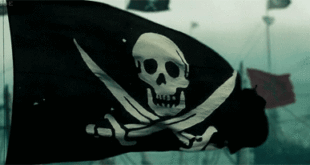Huge F. Scott fan here. I’ve read just about every short story and book he’s even written, save The Last Tycoon. I haven’t read it because it is the only book of his I haven’t read and if I read it now — well there is nothing else of him to read. I guess I’m saving it for a later date. I read this passage before in his biography, but it made a more impactful impression on me this weekend, thinking about the market we’re in and how it feels invincible and how every I know seems to have at least $500,000 in the market. It is the byproduct of a decade of uninterrupted stock market gains — the likes we’ve never seen before.
Well, maybe not ever. This brand of speculation has dotted American history and it always felt great in the midst of all the grandeur. No one thought it would end — until it did.
F. Scott on the end of the roaring 20s.
If you enjoy the content at iBankCoin, please follow us on TwitterThe Jazz Age had had a wild youth and a heady middle age. There was the phase of the necking parties, the Leopold-Loeb murder (I remember the time my wife was arrested on Queensborough Bridge on the suspicion of being the “Bob-haired Bandit”) and the John Held Clothes. In the second phase such phenomena as sex and murder became more mature, if much more conventional. Middle age must be served and pajamas came to the beach to save fat thighs and flabby calves from competition with the one-piece bathing-suit. Finally skirts came down and everything was concealed. Everybody was at scratch now. Let’s go–
But it was not to be. Somebody had blundered and the most expensive orgy in history was over.
It ended two years ago [1929], because the utter confidence which was its essential prop received an enormous jolt, and it didn’t take long for the flimsy structure to settle earthward. And after two years the Jazz Age seems as far away as the days before the War. It was borrowed time anyhow–the whole upper tenth of a nation living with the insouciance of grand dukes and the casualness of chorus girls. But moralizing is easy now and it was pleasant to be in one’s twenties in such a certain and unworried time. Even when you were broke you didn’t worry about money, because it was in such profusion around you. Towards the end one had a struggle to pay one’s share; it was almost a favor to accept hospitality that required any traveling. Charm, notoriety, mere good manners weighed more than money as a social asset. This was rather splendid, but things were getting thinner and thinner as the eternal necessary human values tried to spread over all that expansion. Writers were geniuses on the strength of one respectable book or play; just as during the War officers of four months’ experience commanded hundreds of men, so there were now many little fish lording it over great big bowls. In the theatrical world extravagant productions were carried by a few second-rate stars, and so on up the scale into politics, where it was difficult to interest good men in positions of the highest importance and responsibility, importance and responsibility far exceeding that of business executives but which paid only five or six thousand a year.
Now once more the belt is tight and we summon the proper expression of horror as we look back at our wasted youth. Sometimes, though, there is a ghostly rumble among the drums, an asthmatic whisper in the trombones that swings me back into the early twenties when we drank wood alcohol and every day in every way grew better and better, and there was a first abortive shortening of the skirts, and girls all looked alike in sweater dresses, and people you didn’t want to know said “Yes, we have no bananas,” and it seemed only a question of a few years before the older people would step aside and let the world be run by those who saw things as they were–and it all seems rosy and romantic to us who were young then, because we will never feel quite so intensely about our surroundings any more.






Grab the Pussy 2020!!
I’ve only read (and re-read) Gatsby, what’s second best?
Tender Is the Night is worth a read. Still, Gatsby is his masterpiece. However, I think, but most would disagree, that his second rate writing is heads and shoulders above most others writers of the Lost Generation. Hemingway wrote better short stories.
The first novella of Hemmingway’s “Islands in the Stream” – Bimini is my favorite of all his writings. It was before he was pissed off at the world and women and was in the groove of life prior to the grip of depression.
The Beautiful and the Damned is not as highly regarded, but it’s my personal favorite.
Tender is the night is my favorite and then Gatsby.
Short story fav is May Day and Diamond and Big as the Ritz
Irrational confidence!